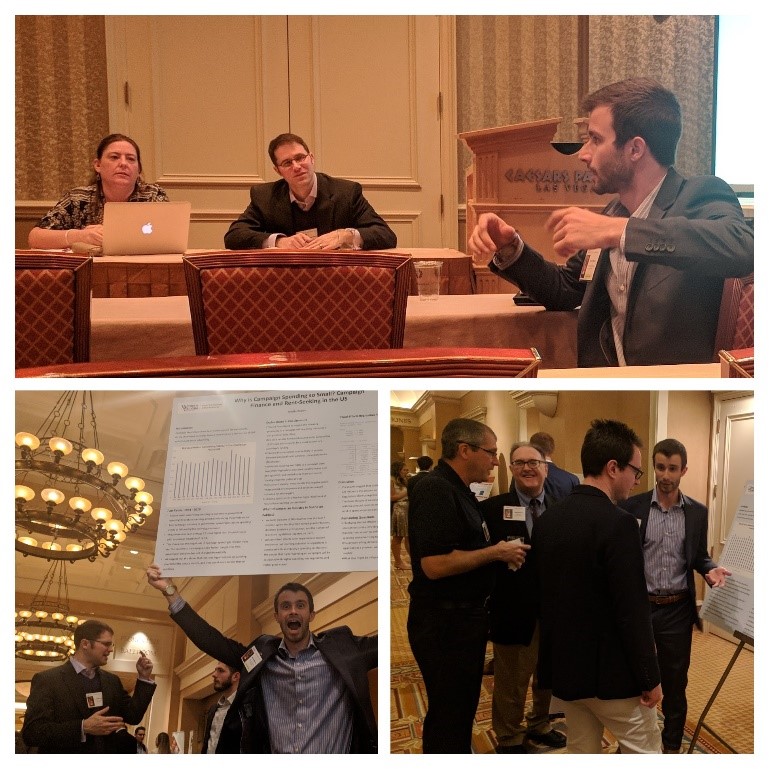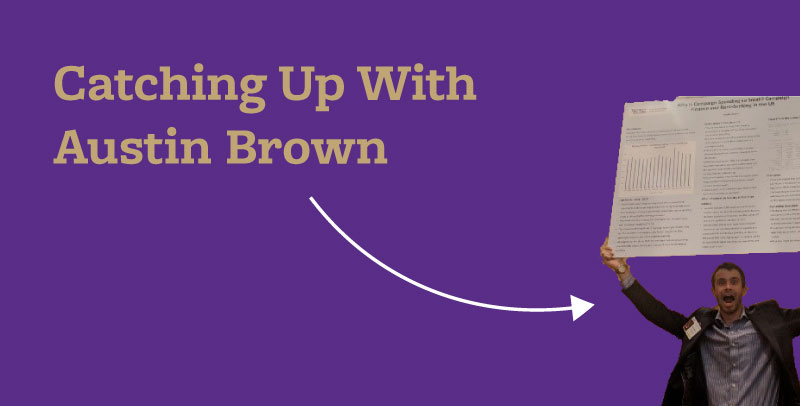We’ll occasionally use this blog to catch up with folks who have worked on past Center-supported projects. In this post, we catch up with Austin Brown.
Austin graduated from WCU in 2016 with a degree in Special Studies, an option that lets WCU students set their own course of study. Austin crafted his degree plan to cover his interests in chemistry & biology (he is a winemaker), philosophy (he is a curious, deep thinker), and economics (he is pragmatic!). After graduating, he spent a year as a vineyard manager at a large winery downstate. Then, one Sunday during the summer of 2017, Austin came back for a visit. Over lunch in West Asheville, he explained that he never could shake his interest in pursuing a Ph.D. “Well Austin,” I said. “That’s great but you’re not ready.”
So, long story short, Austin spent the following academic year as CSFE’s inaugural participant in our Post-Baccalaureate Fellows Program. This program bridges recent WCU grads to doctoral studies.* Starting in Fall 2017, Austin worked under WCU economics faculty developing research skills while taking a couple of extra math courses, researching doctoral programs, and writing applications. In Spring 2018 he presented research at a professional conference and made site visits to select graduate programs. By the end of the year, Austin was fielding competing offers from graduate programs and chose the Ph.D. in Entrepreneurship program at Baylor. Check out our podcast together for more about his year as a post-bacc fellow.

Here’s Austin presenting (with gusto!) at the 2018 annual meetings of the Association of Private Enterprise Education.
Now that Austin has completed his first semester of doctoral studies, we wanted to catch up with him.
——————————————————————————————————————–
Q1: Welcome back, Austin. So what’s been going on since you wrapped the Post-Baccalaureate Fellows Program last May?
Thanks for having me back, Dr. Lopez. After wrapping up the Post-Baccalaureate Fellows Program in May, I spent the summer hopping around research workshops and seminars before taking off for the flatlands of Waco, Texas. I started coursework at Baylor in mid-August. In addition, I’ve been independently researching topics of interest, and participating in Present Your Ph.D., a community outreach program that has allowed me to visit schools and talk to K-12 students about entrepreneurship. My second semester is now underway, which with it brings courses in strategic management, causal inference, and teaching in higher education.
Q2: Why a Ph.D.? What do you want to do when you “grow up”?
A Ph.D. interested me because of the doors it opens. First off, it’s the only surefire way to land a job as a professor. I love teaching and provoking someone’s curiosity, and getting a Ph.D. opens that door for me. On top of that, a Ph.D. in any discipline is a research degree. You learn to seek out the information surrounding a question you have, and subsequently produce an articulate answer to it. Learning to do this equips you with tools to apply in any setting with a problem to solve.
Q3: Tell us a little more about your first semester as a Ph.D. student. How would you describe it?
You get exactly what you put into it. I mean, if someone just wants to jump hurdles for 4 years and get the degree, they can do that. Seems pretty unfulfilling, but it’s an option. But if you have ambitions to practice your craft and refine your ideas, a Ph.D. offers you the chance to do that; to create additional hurdles on your own. The time and effort you choose to allocate to the exploration of ideas determines your development as a thinker, and you have full autonomy in that decision. It’s a lot like exercise. No one keeps you from taking shortcuts, and if you choose to take them, shrug off the extra effort, and fail to challenge yourself, you hinder your outcomes.
Q4: You left WCU with an interest in studying the wine industry. Has your first semester of Ph.D. work broadened and/or deepened your research interests?
I would say my research interests have broadened pretty considerably. My interests in wine production haven’t dropped off, and I have every intention to involve myself in production again when I have the means to do so by my own standards. I want to make natural wines, and I’d like it if other producers did the same. But academic publications aren’t the place to push that agenda. Those ideas are better suited for a book or consulting work. And I’m content with this. Also, I feel that I can do impactful and fulfilling academic research beyond wine. For instance, I’m currently working on a project investigating the transfer of university discoveries to entrepreneurs. And longer term, I’m developing an interest in studying entrepreneurship under conditions of poverty.
Q5. Very cool. Last question. What advice do you have for a third-year undergrad who wants to pursue doctoral studies?
I’d offer three pieces of advice here. First, make a point to sit down with at least three professors in the areas of study you want to pursue and talk to them about your interest. They can connect you with a broader network of academics, help you identify programs that satisfy your interests, and perhaps most importantly, write you a letter of recommendation. Make sure you develop relationships and maintain them, because these professors can help you get in to grad school, find a job later on, or become a research coauthor.
Second, do not count on these professors for everything! No matter what you think, they are busier than you. They also don’t have the answers to all of your questions, nor should they. This is your decision, and thus it is your responsibility to seek out information. You should expect to figure out who to get in touch with at respective programs on your own. You should also try to learn more about your field of interest; find out what the top journals are, look at the work that has been published in the past few years, and make sure the topics interest you. Ask your professor if they know a current PhD student you can bother instead of them. Aspirational as you may be, you will not rewrite the agenda of a field of study in your dissertation. Allocate a few hours a week to investigating your interests thoroughly, because you are only doing yourself a favor.
Build a routine of reading and writing. Your studies will demand that you become an efficient reader and an effective writer. You will benefit if you start practicing now. You don’t have to show up with a published article or brainstormed dissertation. But expect to need to be able to read (and process) at least 100 pages a week. Even if you’re practicing on non-academic writing, reading daily will make you improve. And as for writing, you have to communicate your thoughts concisely and logically. I was the student that started writing papers the day (or perhaps sometimes night) before they were due. This simply won’t fly if you want to put out quality work. When you write, make sure you know your first attempt is a draft. Let it sit for a day, don’t touch it at all, then come back and edit it. As a Ph.D. student, writing is mostly a process of revising and editing. You have an initial idea, you put it on paper, and then you spend the next weeks, months, or years (depending on the idea) refining it. Get used to it now, that way when you start your PhD, you are ahead of the curve. You (and your advisor) will thank you.
——————————————————————————————————————– So there you have it folks. We’re caught up with Austin Brown. Until the next time…
* By the way, we have extended the Post-Baccalaureate Program to fourth-year students too, and we’ve renamed it the Pre-Doctoral Fellows Program.

